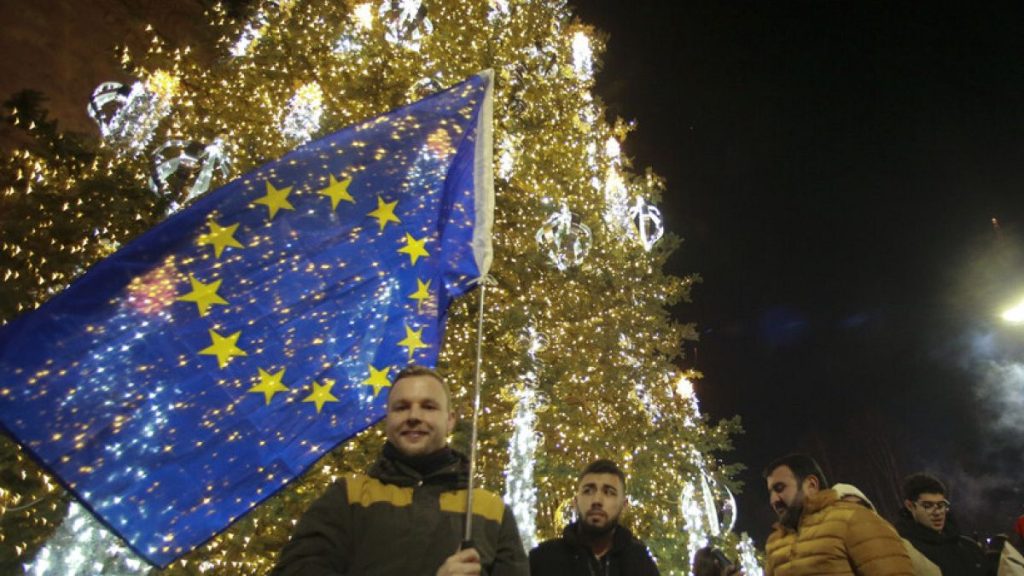Tens of thousands of pro-Europe protesters gathered outside Georgia’s parliament building in Tbilisi for the 34th day in a row to demonstrate against the ruling Georgian Dream party’s decision to suspend the country’s EU accession talks. The protests began after Prime Minister Irakli Kobakhidze announced the suspension, leading to ongoing mass demonstrations. Police have used tear gas, riot teams, and water cannons to disperse the crowds, which have often turned violent. The protesters are calling for new parliamentary elections and the release of activists and protesters who have been detained.
On New Year’s Eve, protesters flooded the streets of Tbilisi to continue voicing their dissent. In a rare show of protest combined with celebration, demonstrators organized a traditional Georgian feast known as a Supra, where they shared food and drinks to symbolize unity. The protestors see their gathering not just as an act of defiance but also as a celebration of their resilience and solidarity. They have pledged to continue protesting until their demands are met, even as the calendar turned to 2025. Outside Gldani Prison, where many detained protesters are being held, a separate march was organized in a display of collective strength.
The political crisis in Georgia has drawn concern from foreign ministers in Germany, France, and Poland, who have condemned the violence against protesters, media, and opposition leaders by Georgian authorities. The three countries have announced measures to end visa-free travel for Georgian diplomatic and service passport holders and are considering further actions in response to the ruling party’s alignment with Russia. The ministers emphasized the importance of human rights, freedom of assembly, and media freedom, stating that the Georgian Dream’s repressive policies have led to a deterioration in their relationship with Georgia.
Former Georgian football player Mikheil Kavelashvili was recently inaugurated as the country’s 6th president, succeeding Salome Zourabichvili. Kavelashvili, who played for the national team and in the English Premier League, was chosen by the Georgian Dream party as their presidential candidate as part of their efforts to maintain control in the country. The ongoing protests in Georgia have coincided with Kavelashvili’s inauguration, highlighting the deep political divisions and tensions within the country. The protesters remain committed to their cause, demanding accountability from the government and pressing for democratic reforms.
The protests in Georgia have been characterized by a mix of defiance and unity, with demonstrators coming together to voice their concerns about the government’s policies. Rustaveli Avenue, a central thoroughfare in Tbilisi, has been a focal point for the protests, as tens of thousands have gathered there to make their voices heard. The protesters have used various tactics, including organizing traditional feasts and marches, to amplify their message and demonstrate their determination. Despite facing police crackdowns and political challenges, the protesters remain resolute in their goal of achieving systemic change and ensuring that their voices are heard.
As the protests in Georgia continue, the international community is closely monitoring the situation and expressing solidarity with the demonstrators. Germany, France, and Poland have been vocal in their support for the Georgian people’s democratic aspirations and have condemned the government’s crackdown on dissent. The ongoing political crisis in Georgia has highlighted the importance of upholding human rights, freedom of expression, and the rule of law. The protesters remain committed to their cause, determined to hold their leaders accountable and bring about meaningful change in the country’s political landscape.


